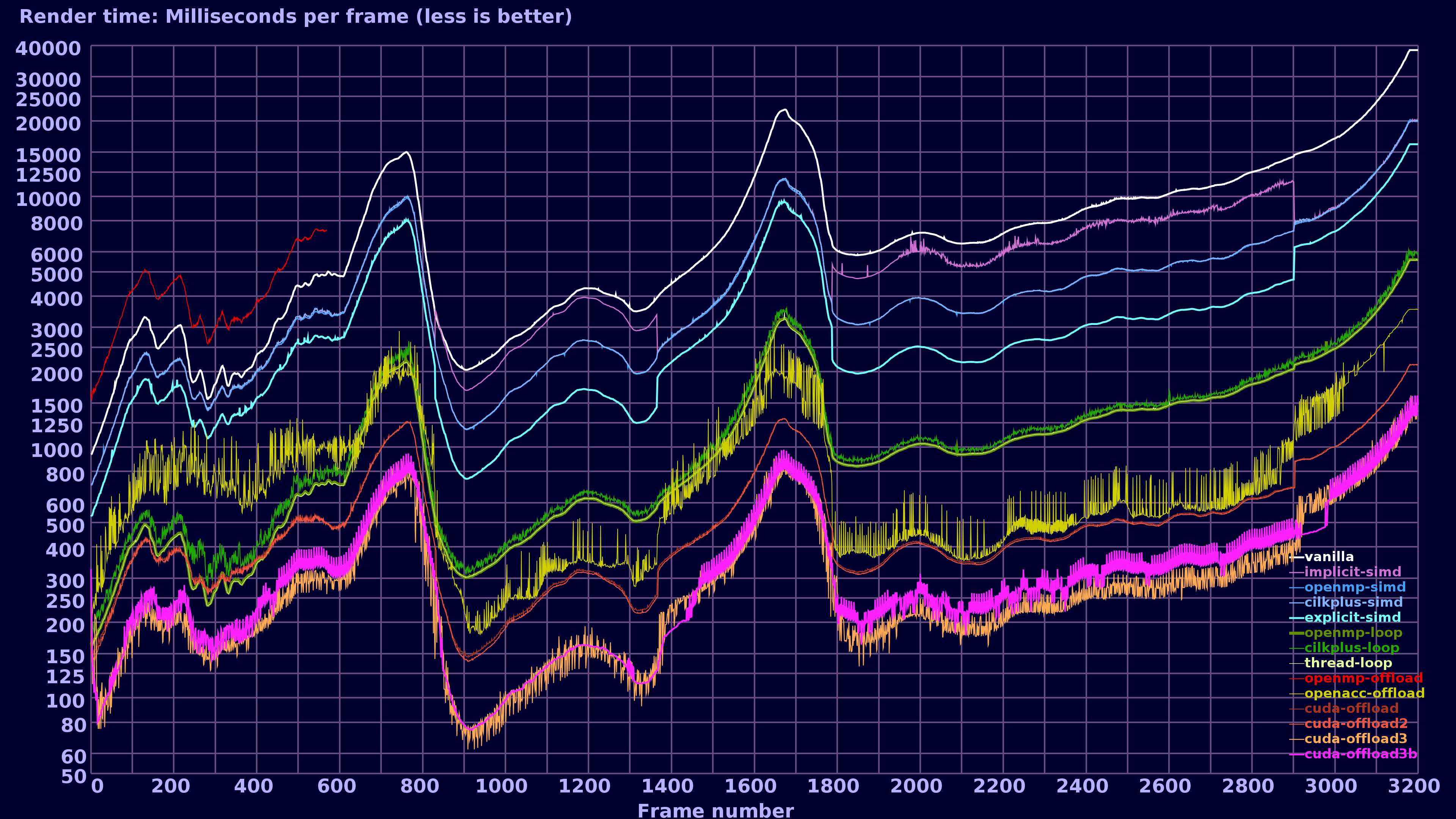bisqwit / Cpp_parallelization_examples
cpp_parallelization_examples
The study & production material for the video series:
- https://www.youtube.com/watch?v=Pc8DfEyAxzg (Parallelism in C++ :: Part 1/3: SIMD (multitasking on single core / vector mathematics)
- https://www.youtube.com/watch?v=MfEkOcMILDo (Parallelism in C++ :: Part 2/3: Threads (hyperthreading, multiple cpu cores)
- https://www.youtube.com/watch?v=kIA_UtdVabQ (Parallelism in C++ :: Part 3/3: Offloading (OpenMP, OpenACC, CUDA)
Note that commit 0680aa19f50f4198f3d36d30fe778a50331f9bf5 is the state the programs were when episode 3 was released. After that, the example programs have been updated, bugs fixed etc.
Current timings chart on Bisqwit’s computer:

Program list:
- mandelbrot-vanilla: Vanilla algorithm without any parallelisation attempts. Simple Mandelbrot fractal rendering with some very basic optimizations that will be identical across all the other programs in this list.
- mandelbrot-implicit-simd: Same as mandelbrot-vanilla, but rewritten as if it were SIMD; to attract SIMD optimizations in a compiler to manifest.
- mandelbrot-openmp-simd: Same as mandelbrot-implicit-simd, but with OpenMP SIMD pragmas to help the compiler add SIMD optimization where they most probably would help
- mandelbrot-cilkplus-simd: Same as mandelbrot-openmp-simd, but with CilkPlus pragmas rather than OpenMP pragmas
- mandelbrot-explicit-simd: Same as mandelbrot-implicit-simd, but completely rewritten with Intel Intrinsics.
- mandelbrot-openmp-loop: Same as mandelbrot-vanilla, but add OpenMP pragma for simple per-scanline threading.
- mandelbrot-cilkplus-loop: Same as mandelbrot-openmp-loop, but with CilkPlus equivalents.
- mandelbrot-thread-loop: Same as mandelbrot-openmp-loop, but using C++11 standard threads rather than pragmas. Algorithm is identical.
- mandelbrot-openmp-offload: Same as mandelbrot-vanilla, but with minimal correct implementation at OpenMP offloading.
- mandelbrot-openacc-offload: Same as mandelbrot-vanilla, but with minimal correct implementation at OpenACC offloading.
- mandelbrot-cuda-offload: Same as mandelbrot-vanilla, but with minimal correct implementation at CUDA offloading.
- mandelbrot-cuda-offload2: Same as mandelbrot-cuda-offload, but with small optimizations to get better performance.
- mandelbrot-cuda-offload3: A mixture between mandelbrot-cuda-offload2, mandelbrot-thread-loop, and mandelbrot-explicit-simd.
- mandelbrot-cuda-offload3b: Same as mandelbrot-cuda-offload3, but with small changes to threading logic in attempt to get better performance. (It failed.)
Misc. instructions
Build OpenMP programs
Add -fopenmp to both compiler and linker commandlines
When offloading, you may get linker problems from math functions
if you do an optimized build. To resolve, add -foffload=-lm -fno-fast-math -fno-associative-math
Build CilkPlus programs
Add -fcilkplus to both compiler and linker commandlines, and -lcilkrts to linker commandline
Build OpenACC programs
Add -fopenacc to both compiler and linker commandlines
When offloading, you may get linker problems from math functions
if you do an optimized build. To resolve, add -foffload=-lm -fno-fast-math -fno-associative-math
Note that you may get a significantly better performance with PGI Community Edition, which has a much more mature OpenACC implementation than with GCC does.
Build thread programs
Add -pthread to linker commandline
Build CUDA programs
- Use nvcc
- Add
-x cuif your filename extension is something other than.cu
Run OpenACC offloading programs
Add one or more environment variables before running the program, to control offloading:
- Optional:
LD_LIBRARY_PATH=/usr/local/lib64 - Optional:
ACC_DEVICE_TYPE=<type> - Optional:
GOMP_DEBUG=1
Possible device types:
-
hsafor HSA -
nvidiaornvptxfor NVidia PTX -
micorintelmicfor Intel MIC (possibly emulator) -
hostfor running on host
More information: https://gcc.gnu.org/wiki/Offloading
Run OpenMP offloading programs
Add one or more environment variables before running the program, to control offloading:
OMP_DEFAULT_DEVICE=<number>LD_LIBRARY_PATH=/usr/local/lib64- Optional:
OMP_DISPLAY_ENV=true - Optional:
GOMP_DEBUG=1
Mapping between device numbers and offloading targets: Unknown, I found them experimentally. In any case, they start from 0 upwards.
Installing CUDA compiler:
apt-get install nvidia-cuda-toolkit
Building offloading-ready GCC:
More information: https://gcc.gnu.org/wiki/Offloading
ATTENTION: Do not just dump all this into your shell as a copypaste. You need to understand what you are doing.
# Preparation step for NVidia PTX offloading
# Download and install NVidia PTX target tools
cd /usr/local/src
git clone https://github.com/MentorEmbedded/nvptx-tools
cd nvptx-tools
./configure
make -j8
make install
# Preparation step for HSA offloading
# Download and install HSA library and drivers
#
# Note: This has changed. See https://github.com/RadeonOpenCompute for new instructions.
cd /usr/local/src
git clone https://github.com/HSAFoundation/HSA-Runtime-AMD.git
dpkg -i HSA-Runtime-AMD/ubuntu/hsa-runtime*_amd64.deb
git clone -b kfd-v1.6.x https://github.com/HSAFoundation/HSA-Drivers-Linux-AMD.git
echo 'KERNEL=="kfd", MODE="0666"' | sudo tee /etc/udev/rules.d/kfd.rules
dpkg -i HSA-Drivers-Linux-AMD/kfd*/ubuntu/libhsakmt*.deb
# Let’s build GCC. Go to a suitable build directory with enough free space
cd /dev/shm
# Download and extract GCC source code
wget ftp://ftp.gwdg.de/pub/misc/gcc/releases/gcc-7.1.0/gcc-7.1.0.tar.bz2
tar xvfj gcc-7.1.0.tar.bz2
cd gcc-7.1.0
# GCC build, part 1: NVidia PTX offloading compiler
# Download Newlib port for NVPTX
git clone https://github.com/MentorEmbedded/nvptx-newlib newlib # Still in the gcc-7.1.0 directory
# Build NVidia PTX offloading compiler
rm -rf build # Still in the gcc-7.1.0 directory
mkdir build
cd build
../configure \
--target=nvptx-none --enable-as-accelerator-for=x86_64-linux-gnu \
--disable-sjlj-exceptions --enable-newlib-io-long-long \
--enable-checking=yes,df,fold,rtl \
--enable-languages=c,c++,lto --with-build-time-tools=/usr/local/nvptx-none/bin
make -j8
make install
# GCC build, part 2: MIC offloading compiler & emulator
# Build MIC offloading compiler & emulator
# Add --disable-bootstrap to configure to make the build time shorter
rm -rf * # Still in the "build" directory
../configure \
--build=x86_64-intelmicemul-linux-gnu --host=x86_64-intelmicemul-linux-gnu \
--target=x86_64-intelmicemul-linux-gnu --enable-as-accelerator-for=x86_64-linux-gnu \
--enable-liboffloadmic=target \
--enable-languages=c,c++,lto
make -j8
make install
# GCC build, part 3: Build actual host compiler
# Build the actual compiler, with support for both targets
# Add --disable-bootstrap to configure to make the build time shorter
# If you want to support HSA, add --with-hsa-runtime=/opt/hsa to configure
# If you want to support HSA, add also ,hsa to the --enable-offload-targets parameter.
# Add any languages you need into --enable-languages
rm -rf * # Still in the "build" directory
../configure \
--build=x86_64-linux-gnu --host=x86_64-linux-gnu --target=x86_64-linux-gnu \
--enable-offload-targets=x86_64-intelmicemul-linux-gnu,nvptx-none=/usr/local/nvptx-none \
--enable-languages=c,c++,lto,jit --enable-lto --enable-host-shared \
--enable-liboffloadmic=host \
--with-cuda-driver=/usr
make -j8
make install

